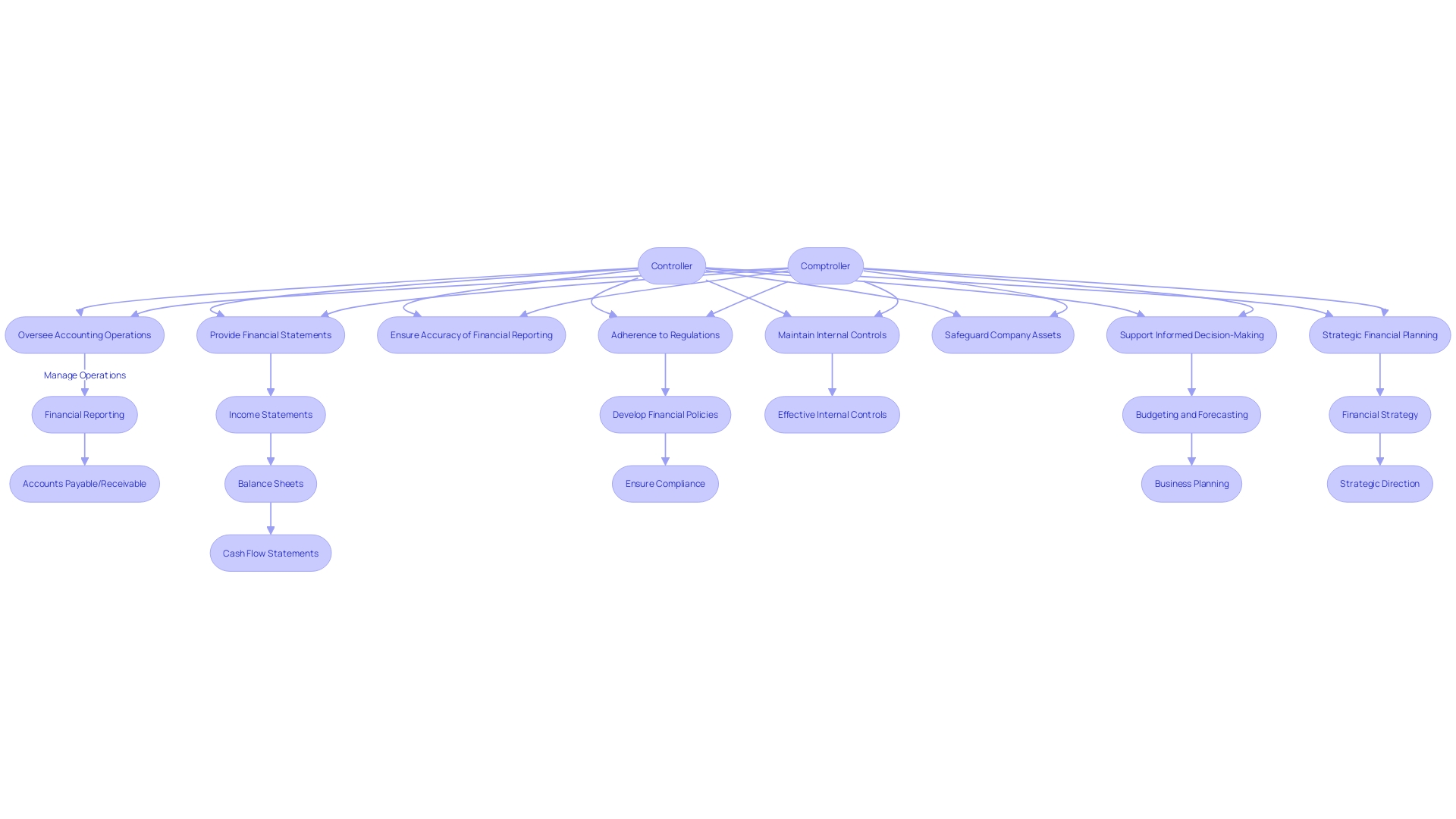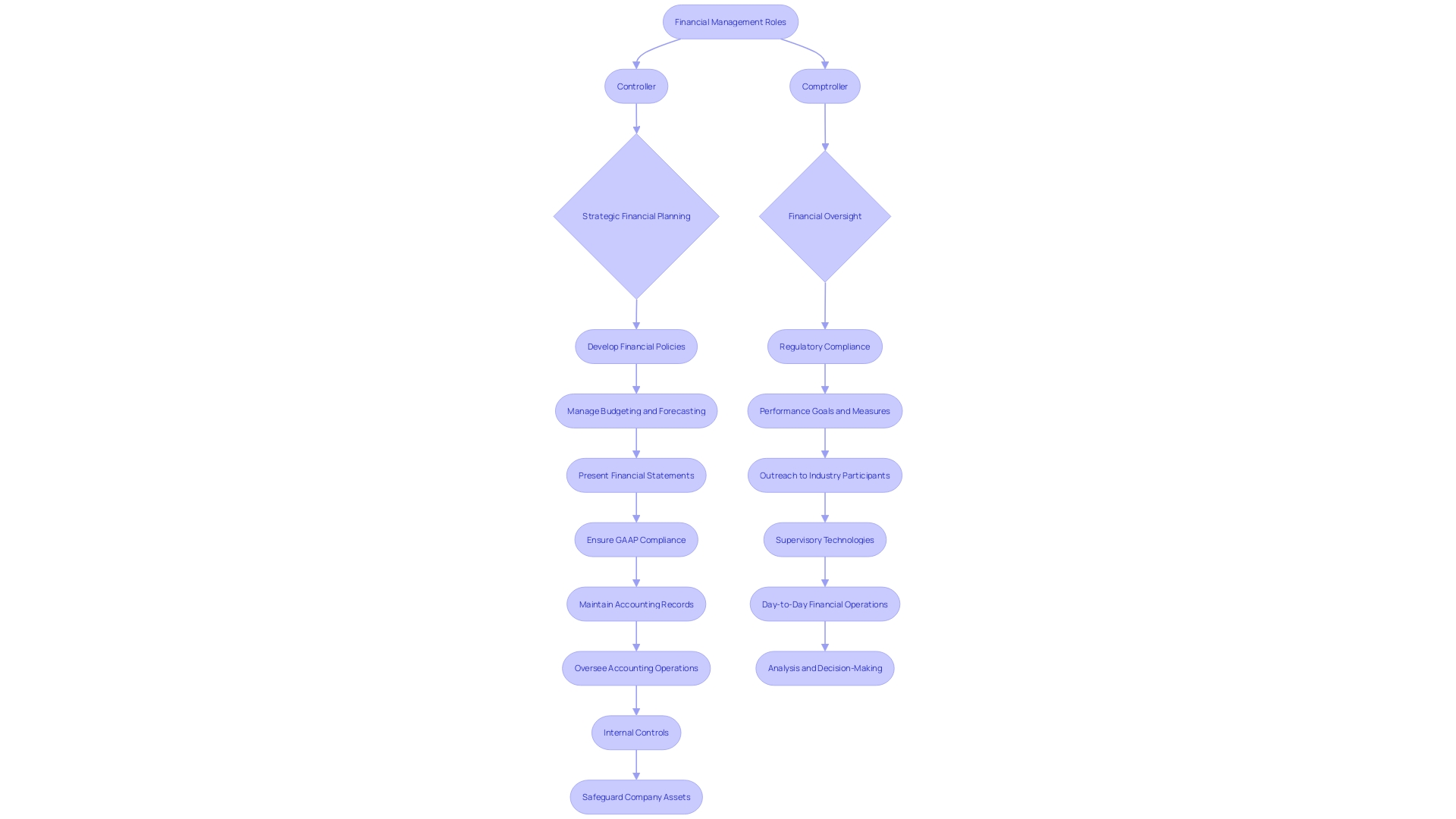Introduction
Distinguishing between the roles of a controller and a comptroller is crucial for financial clarity in an organization. Controllers serve as financial stewards, overseeing accounting operations and providing vital financial statements. Comptrollers, on the other hand, focus on regulations and internal controls to safeguard company assets.
In this article, we will explore the key responsibilities of both roles and highlight the differences between them. By understanding these distinctions, CFOs can ensure effective financial management and decision-making in their organizations.
I. Definitions and Roles
Distinguishing between the roles of a controller and a comptroller within the realm of cost accounting is pivotal for financial clarity in an organization. Controllers are the financial stewards of a company, overseeing accounting operations, and ensuring the accuracy of financial reporting. They provide vital financial statements such as income statements, balance sheets, and cash flow statements, offering a snapshot of the company's financial standing.
Comptrollers, meanwhile, often share similar responsibilities but may focus on adherence to regulations and maintaining internal controls. Their work is integral to safeguarding company assets and supporting informed business decision-making. Both positions are essential, with controllers often being the cornerstone of strategic financial planning and comptrollers ensuring the integrity and compliance of financial practices.

II. Key Responsibilities of a Controller
Controllers are the linchpins of financial operations within a business, tasked with a broad array of critical functions that underpin sound fiscal management. They are chartered with the meticulous preparation of financial plans, the crafting of budgets, and the projection of future financial performance. Their expertise is paramount in ensuring adherence to the complex web of financial regulations and reporting standards that govern corporate conduct.
In their capacity as analytical savants, controllers scrutinize financial data to distill valuable insights that bolster strategic decision-making at the highest levels. Their counsel is instrumental in piloting the organization's financial health, as they harmonize long-term objectives with immediate fiscal realities. It is through their unwavering commitment to precision in financial reporting that businesses can confidently navigate the ever-evolving landscape of corporate governance and market challenges.
The pivotal role of controllers echoes across various industries, as exemplified by Nets, a stalwart in digital payment solutions. Nets' innovative approach to presenting complex technical data in user-friendly formats underscores the evolving demands on financial reporting. Controllers today are expected to not only manage and interpret data but also present it in ways that are accessible and engaging to diverse audiences.
In the quest for financial clarity and regulatory conformity, a controller's influence is profound. They are not merely guardians of accounting processes but strategic advisers whose impact can steer a company through the financial tumult with foresight and acumen.
III. Key Responsibilities of a Comptroller
-
Comptrollers are the guardians of financial integrity within a company. Their responsibilities encompass the meticulous upkeep of financial records, including essential tasks such as bookkeeping, managing accounts payable and receivable, and ensuring transactions are recorded accurately. They are instrumental in deploying robust internal controls to protect company assets and ward off fraud. By rigorously upholding the accuracy of financial data, controllers provide a foundation of trust and reliability in an organization's financial reporting.
-
The role of a comptroller extends into strategic realms as well. They not only safeguard the financial data but also ensure that it reflects the latest costs and is indicative of the company's current financial health. This involves analyzing financial statements, collaborating with management to understand the monthly reports, and utilizing advanced tools to detect and prevent sophisticated fraud schemes that can be hidden within regular financial processes.
-
In today's digital era, the role of a comptroller is increasingly complex. They must navigate the vast amounts of data generated by modern business operations, which often include intricate transactions and diverse accounting treatments across multiple subsidiaries. Their expertise is crucial in identifying irregularities that traditional methods may overlook, thus maintaining the fidelity of financial reporting in a landscape marked by evolving fraudulent activities and sophisticated financial statement fraud schemes.
-
As the financial landscape continues to evolve, comptrollers are at the forefront of driving transformation and innovation within their organizations. They serve as strategic partners, equipped with the know-how to leverage supervisory technologies and performance measures aligned with the company's strategic objectives, enhancing the organization's ability to adapt to market changes and potential economic disruptions.
IV. Differences Between Controller and Comptroller
Controllers and comptrollers both play vital roles in financial management, but their responsibilities diverge in key areas. Controllers are the architects of strategic financial planning and analysis. They delve into the financial records to provide strategic guidance, ensuring the company's financial strategies are robust and effective.
This role is pivotal in creating financial statements that are not only accurate but also strategic tools for decision-making. In contrast, comptrollers focus on financial oversight, emphasizing regulatory compliance and the day-to-day management of financial operations. They are instrumental in maintaining the integrity of financial reports and safeguarding the company's assets through rigorous internal controls.
While controllers often hold a more senior position with substantial influence on decision-making and typically report to the CFO or CEO, comptrollers may find themselves reporting to controllers or other financial executives. The delineation of these roles is critical for the smooth operation of a company's financial health and strategic directions

Conclusion
In conclusion, distinguishing between the roles of a controller and a comptroller is crucial for financial clarity in an organization. Controllers oversee accounting operations and provide vital financial statements, while comptrollers focus on regulations and internal controls to safeguard company assets.
Controllers are responsible for financial planning, budgeting, and analyzing data for strategic decision-making. Comptrollers maintain financial records, manage accounts, and ensure compliance with regulations.
These roles differ in their emphasis, with controllers focusing on strategic financial planning and analysis, and comptrollers prioritizing regulatory compliance and day-to-day financial operations.
By assigning the right individuals to each role, CFOs can ensure effective financial management and decision-making. Controllers provide strategic guidance, while comptrollers ensure regulatory compliance and internal controls.
Both roles play a crucial part in driving transformation and innovation within organizations. They leverage technology and performance measures to navigate the complexities of financial management.
By embracing these roles and leveraging their expertise, CFOs can position their organizations for success in an ever-changing business environment. Clear delineation of responsibilities is essential for the smooth operation of a company's financial health and strategic direction.




